Chapter 7 Bankruptcy Forms in California
Home » Practice Areas » Orange County Bankruptcy » Chapter 7 Bankruptcy » Chapter 7 Bankruptcy Forms
Practice Areas
Chapter 7 Bankruptcy Forms
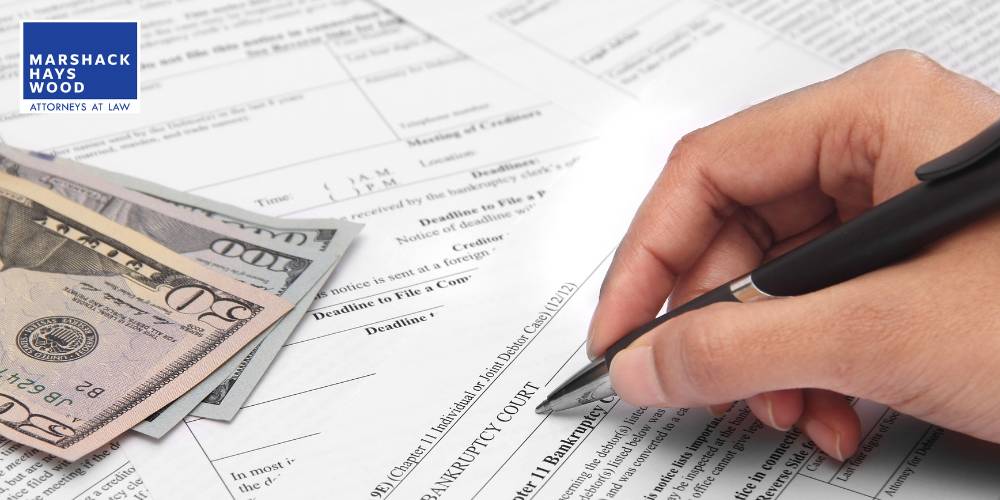
Chapter 7 bankruptcy can be a powerful debt relief tool that can provide a path toward financial recovery and peace of mind. However, in order to successfully navigate the bankruptcy process, the petitioner must gather and organize a number of documents and forms regarding their financial situation.
Looking to file for Chapter 7 bankruptcy, but you’re not sure what documents you’ll need to gather or what forms you’ll need to fill out? The experienced Orange County bankruptcy attorneys at Marshack Hays Wood are here to help you complete the required Chapter 7 bankruptcy forms in California accurately and efficiently.
Get started on your path to financial recovery–call us at (949) 333-7777 to schedule a free consultation with an attorney on our team.
What Forms Are Needed for Chapter 7 in Bankruptcy?
Individuals filing Chapter 7 bankruptcy typically need to file several forms. Below are some of the forms normally required to successfully file for bankruptcy:
- Form 101 – Voluntary Petition for Individuals Filing for Bankruptcy
- Form 106Dec – Declaration of Individual Debtor’s Schedules of Assets and Liabilities
- 106Sum – Summary of Assets and Liabilities
- 106A/B – Personal property
- 106C – Property Claimed as Exempt
- 106D – List of Creditors Who Hold Secured Debts
- 106E/F – List of Creditors Who Hold Unsecured Claims
- 106G – Executory Contracts and Unexpired Leases
- 106H – Codebtors
- 106I – Income
- 106J – Expenses
- Form 107 – Statement of Financial Affairs for Individuals Filing for Bankruptcy
- Form 108 – Statement of Intention for Individuals Filing Under Chapter 7
- Form 122A-1 or Form 122A-2 – Statement of Your Current Monthly Income or Means Test Calculation
Other bankruptcy forms may include fee waiver forms and creditor matrix forms, as well as forms required for your specific jurisdiction. Remember, it’s crucial to complete these forms accurately and truthfully, as they form the basis of your bankruptcy case.
Consulting with a Chapter 7 bankruptcy attorney for guidance is highly recommended to ensure you comply with all legal requirements and properly represent your financial situation.
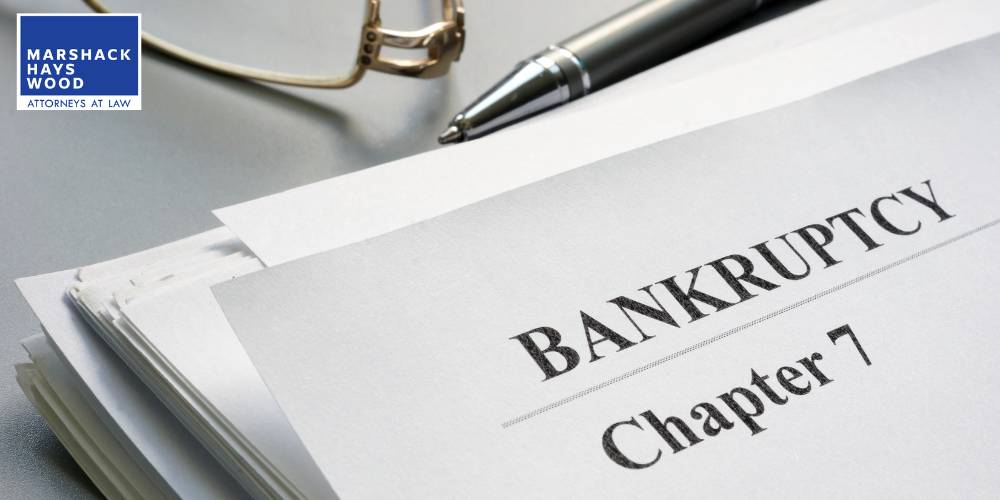
Keeping Your Forms Organized During Bankruptcy
Managing the various forms required for a Chapter 7 bankruptcy in California can be overwhelming, but staying organized is crucial for a smooth process. Start by creating a dedicated filing system, either digitally or in physical folders, categorizing documents by type—such as financial statements, court forms, and correspondence.
Regularly update and review your files to ensure all information is current and accurate to the state of your financial affairs. A checklist can help you track your progress and ensure no vital document is overlooked.
Remember, accurate and organized documentation is key to effectively navigating the complexities of bankruptcy proceedings. If you find it challenging, consider seeking assistance from a bankruptcy attorney who can guide you through organizing and managing these important documents.
What Documents Do I Need to File Chapter 7?
Filing for Chapter 7 bankruptcy involves a detailed and meticulous process, requiring a range of documents that must be prepared and presented accurately. Below are the documents that you’ll need to complete your bankruptcy and ensure compliance with bankruptcy law.
If you have any trouble gathering these documents or filling out any official bankruptcy forms, call Marshack Hays Wood. Our exceptional legal team is prepared to help you fill out any and every bankruptcy form and ensure that you make it through the process in compliance with legal requirements.
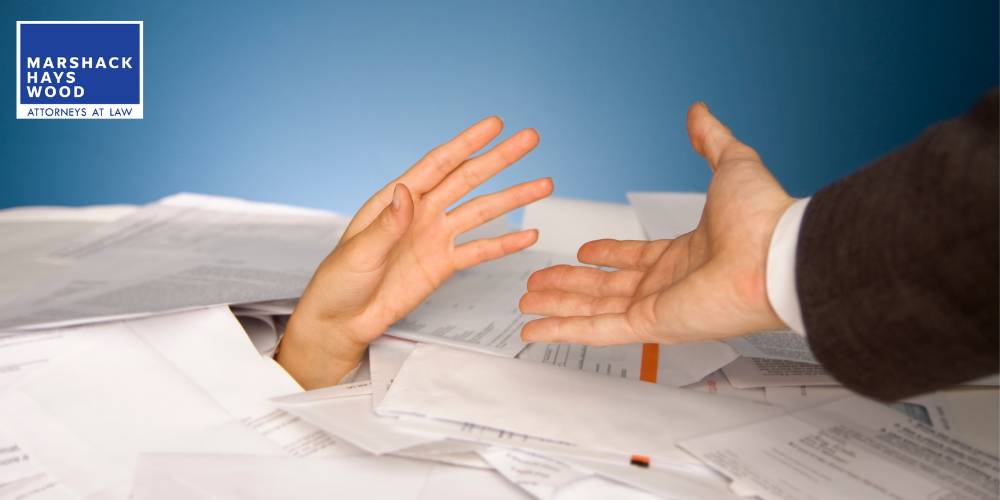
What Documents Do I Need Before Filing?
Before filling out and filing your bankruptcy petition, you’ll need to gather several different documents to submit to your local bankruptcy court. Below are the documents you’ll need to get your bankruptcy case started.
Legal Documents
Before embarking on your Chapter 7 bankruptcy filing, it’s essential to gather all pertinent legal documents. This includes any:
- Previous bankruptcy filings
- Previous divorce decrees
- Past court orders (especially ones that might impact your financial situation)
- Ongoing legal proceedings (like lawsuits or foreclosures)
These legal documents provide a comprehensive picture of your obligations and rights, which is crucial for accurately completing your bankruptcy paperwork.
Financial Documents
Financial documents form the backbone of your bankruptcy case. These documents include:
- Recent tax returns (usually from the last two years)
- Proof of current income (things like pay stubs, unemployment benefits, or business revenue)
- Records of debts (credit card statements, loan documents, and collection notices)
- Bank statements
- Investment account summaries
Other Documents
In addition to legal and financial records, there are other documents you need to gather before filing for Chapter 7 bankruptcy. This includes:
- Identification documents (like your driver’s license and social security card)
- Proof of residency (such as recent utility bills or a lease agreement)
- Certificate of completion for the required credit counseling course (must be completed before filing)
These documents may not directly relate to your finances, but they are essential for verifying your identity and fulfilling bankruptcy requirements.
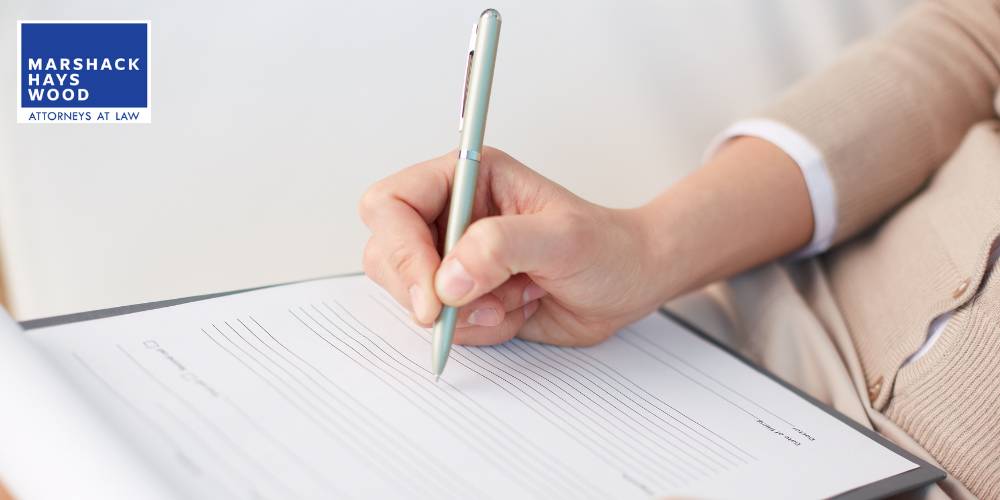
What Documents Do I Need During Filing?
Individuals will need a number of different documents during the filing process, many of which are the required forms that we’ve listed above. Below, we’ll break down exactly what each form is used for and what kind of information will be needed in order to fill each form out.
If you experience any trouble filling out these forms or filing them with the bankruptcy court, don’t hesitate to reach out to a bankruptcy professional like the attorneys at Marshack Hays Wood. We can help you through this difficult process and ensure you receive your bankruptcy discharge.
Current Monthly Income Forms/Means Test Forms
In order to file under Chapter 7 of the bankruptcy code, petitioners must have an income that is below the state median income. Current monthly income forms help prove to the court that you are eligible to file a Chapter 7 bankruptcy.
These include Form 122A-1, which provides a snapshot of your average income over the past six months. If your income is below the state median, you may not need additional documentation. However, if it’s above, you’ll need to complete Form 122A-2 to perform the Means Test, which determines your eligibility for Chapter 7 based on your disposable income and expenses.
Eviction Forms
If you’re facing eviction and wish to halt it through your bankruptcy filing temporarily, specific forms are required. Form 101A, the ‘Initial Statement About an Eviction Judgment Against You,’ needs to be filed if there’s an eviction judgment against you. This form alerts the court to your situation, and can potentially invoke an automatic stay.
Under bankruptcy law, the automatic stay is a legal injunction that temporarily stops any legal proceedings filed against the petitioner, including an eviction. It can provide you with some much-needed breathing room while your bankruptcy case is being processed.
Fee Waiver Forms
The cost of filing for bankruptcy can be a burden. If you cannot afford the filing fee, you’ll need to complete and submit Fee Waiver Forms. This includes Form 103B, the ‘Application to Have the Chapter 7 Filing Fee Waived.’
This form requires detailed information about your income, expenses, and family size to determine your eligibility for a fee waiver. It’s an important document for those with limited financial means, ensuring financial constraints don’t prevent access to debt relief tools like bankruptcy.
Separate Household Expense Forms
During the Chapter 7 filing process, it’s important to accurately detail your living expenses, especially if you have a non-filing spouse or other dependents. Separate Household Expense Forms help delineate your individual expenses from your household’s overall expenses.
These forms require you to list your personal monthly expenses, such as food, clothing, transportation, and healthcare costs. Accurately completing these forms ensures a clear understanding of your financial obligations and living costs, which is crucial for the bankruptcy court to assess your situation.
Bankruptcy Assistance Forms
If you’re receiving assistance from a bankruptcy petition preparer or any non-attorney assistance, you’ll need to fill out Bankruptcy Assistance Forms. These forms, such as the ‘Disclosure of Compensation of Bankruptcy Petition Preparer’ form, are designed to record the details of any services provided and fees charged.
This transparency is essential to ensure that you receive fair and lawful assistance during your bankruptcy process and that the court is aware of all parties involved in your case.
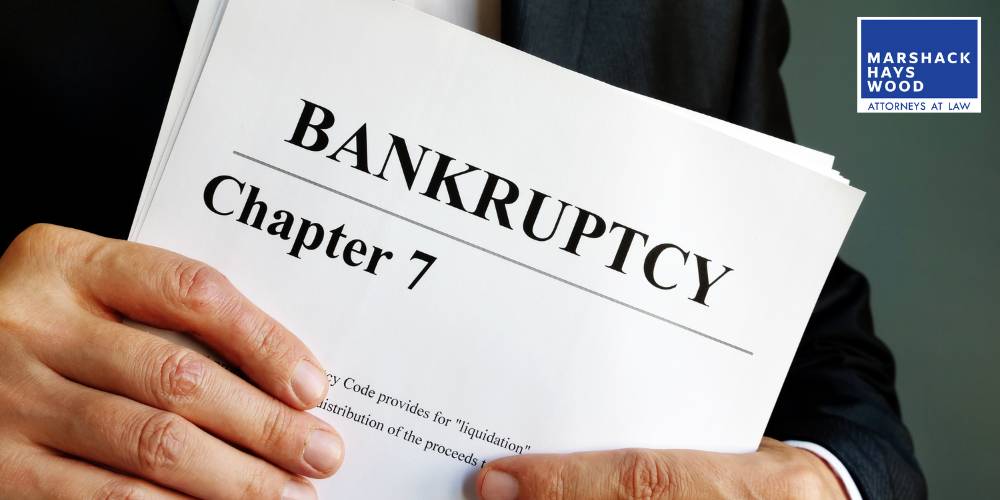
What Documents Do I Need After Filing?
After successfully filing for Chapter 7 bankruptcy, your journey is not yet complete. Post-filing, it’s important to keep track of your documents post-filing and ensure they are organized and accessible. You should gather your bankruptcy case number, all correspondence from the bankruptcy court, and any documents related to asset liquidation or debt discharge. Additionally, you must complete a debtor education course, so be sure to retain your certificate of completion.
Keeping a record of these items ensures you’re prepared for any inquiries and can effectively monitor the progress of your case. It’s also wise to retain copies of all submitted forms for your records. Staying organized and informed post-filing is vital to navigate the final stages of your bankruptcy process smoothly.
California Chapter 7 Bankruptcy Forms
Every bankruptcy case in the U.S. is handled in federal bankruptcy court, but certain states have their own local rules and requirements for those who file bankruptcy within their state. Understanding the specific requirements of each form and how they fit into the broader context of your bankruptcy case is key to a successful filing.
California requires all individuals filing for bankruptcy to file:
- Official Form B21 – Statement of Social Security Number (or other Individual Taxpayer-Identification Number)
- Official Form B1 – Voluntary Petition for Bankruptcy
- Electronic Filing Declaration (if filing electronically)
- Master Mailing List of Creditors
Depending on the circumstances of the filing, the state may also require petitioners to file additional forms, which are listed by the United States Bankruptcy Court.
What About Local Bankruptcy Court Forms?
Local bankruptcy rules (LBRs) are regulations specific to bankruptcy courts within a particular jurisdiction. Central California has its own local forms for petitioners to fill out when filing for bankruptcy, many of which are specific to the circumstances of the petitioner’s bankruptcy.
It’s often advisable to seek legal advice from an experienced bankruptcy attorney to ensure all forms are correctly filled out and submitted in accordance with California bankruptcy law.
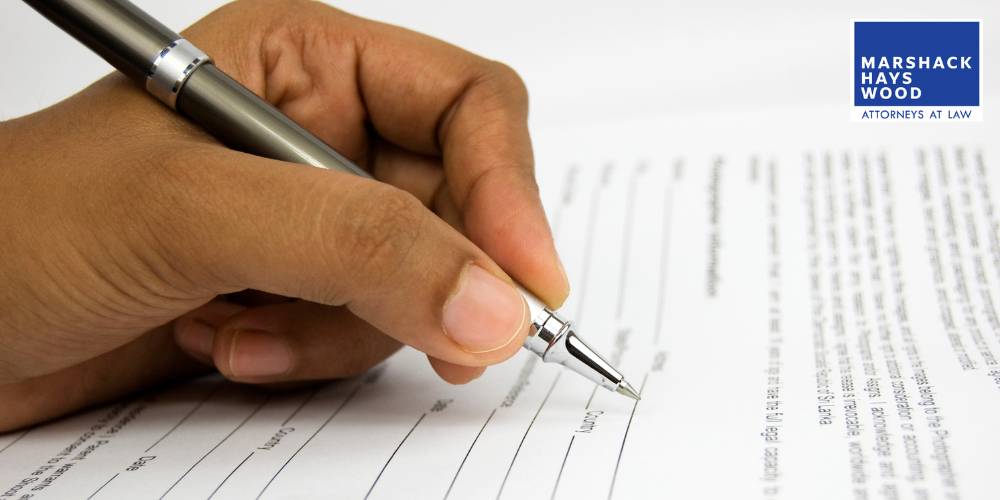
Will Chapter 7 Wipe Out All My Debt?
Chapter 7 bankruptcy, also known as ‘liquidation bankruptcy,’ can provide significant debt relief for individuals and businesses in California. While Chapter 7 offers a fresh start by discharging many types of unsecured debts, it’s essential to understand that not all debts are eligible for discharge.
Generally, a personal bankruptcy under Chapter 7 can wipe out credit card debt, medical bills, personal loans, and certain other unsecured debts. However, it does not eliminate certain obligations such as child support, alimony, most tax debts, student loans (in most cases), and any debts obtained through fraudulent means.
Is It Worth It to File Chapter 7?
Deciding whether to file for Chapter 7 bankruptcy in California is a significant financial decision that should be made carefully. While Chapter 7 offers a powerful way to obtain relief from overwhelming debt, it’s not the right choice for everyone. The decision ultimately depends on your individual circumstances.
If you’re struggling with unmanageable debt, facing foreclosure, or constant creditor harassment, Chapter 7 may be a viable option to get a fresh financial start. However, it’s important to consider the potential impact on your credit score and the assets you may have to surrender as part of the liquidation process.
For example, if you have a car loan, it’s likely a secured debt, meaning that your vehicle will be tied to the loan as collateral. If you file for Chapter 7 bankruptcy, your car will likely be sold, and the funds of the sale will be given to your lender. A bankruptcy attorney can help ensure that you are fully informed of the process, ensuring that you understand exactly what will happen if you decide to file for bankruptcy.
Do I Need an Attorney to File Chapter 7 Bankruptcy?
While it is technically possible to file for Chapter 7 bankruptcy in California without an attorney, it’s highly advisable to seek professional legal assistance. Bankruptcy law is complex and ever-changing, and the guidance of an experienced bankruptcy attorney can be invaluable throughout the process.
Individuals filing for bankruptcy should seek legal advice from a bankruptcy attorney in their jurisdiction. Not only will they be able to help you decide whether or not bankruptcy is right for you, but they can also ensure that all forms and documents are gathered, filled out, and filed correctly and on time.
With their deep understanding of Chapter 7 bankruptcies and the California bankruptcy court system, they can ensure all local forms are completed and filed. They can also communicate with the bankruptcy trustee assigned to the case in order to ensure things are going smoothly.
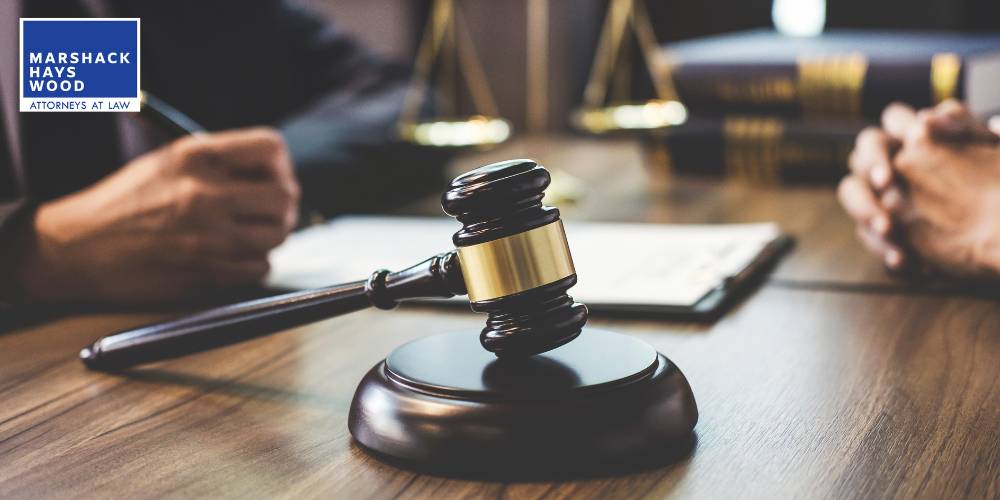
Call a Chapter 7 Bankruptcy Lawyer in Orange County
If you are considering bankruptcy, you need a trusted advocate on your side to ensure your bankruptcy case is handled properly. At Marshack Hays Wood, we understand the financial challenges you may be facing, and we’re here to provide you with the legal guidance you need to regain control of your finances.
With decades of experience in bankruptcy law, we have the knowledge and skills to navigate the complexities of the bankruptcy process on your behalf. Let us help you regain control of your financial well-being and pave the way for a brighter tomorrow.
Call us at (949) 333-7777 or contact us online to schedule a free initial consultation with an attorney on our team.
READY TO GET STARTED?
At Marshack Hays Wood, our attorneys provide the legal support you need to move forward with confidence. Let us help you take the first step toward financial stability.
